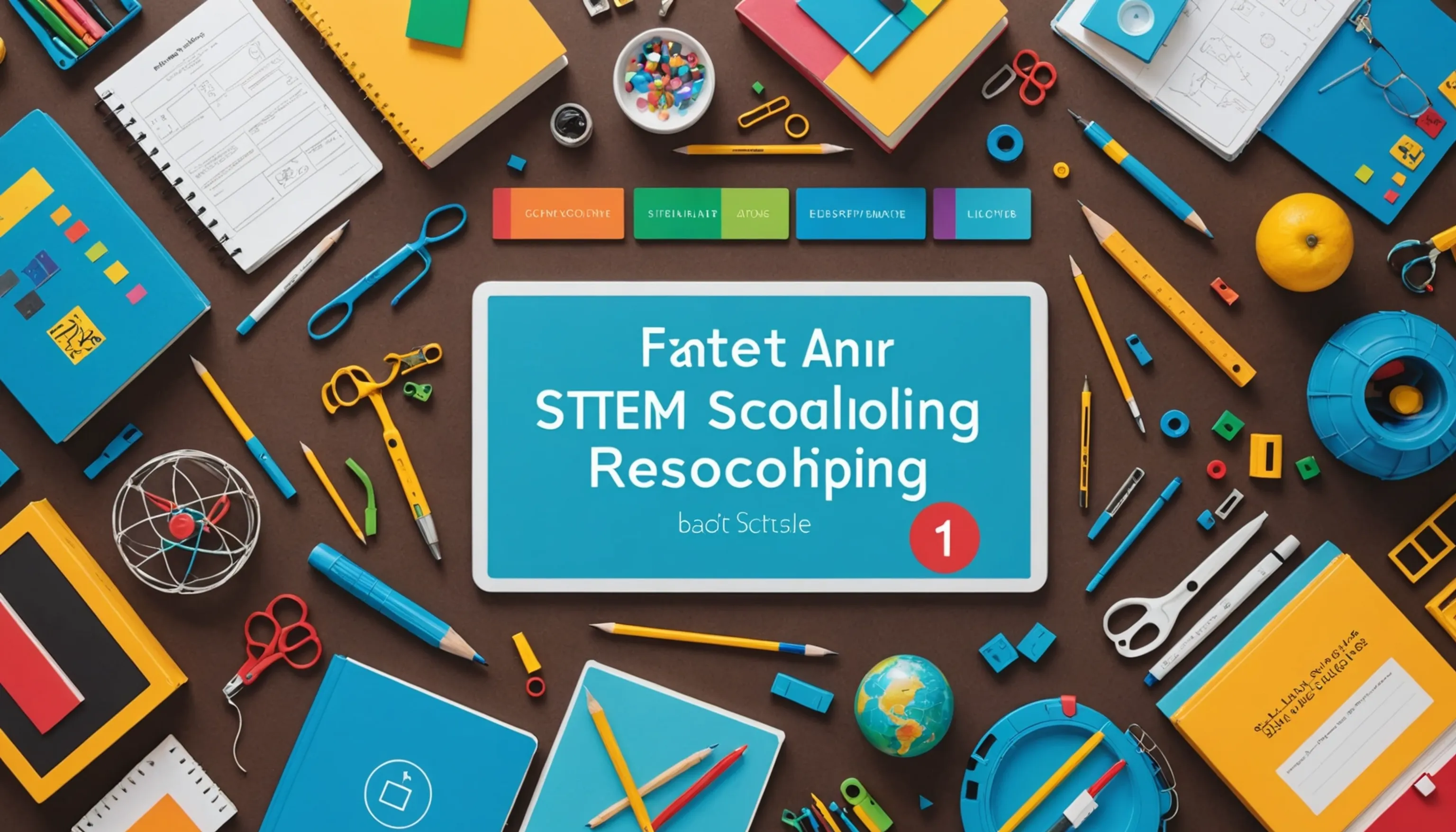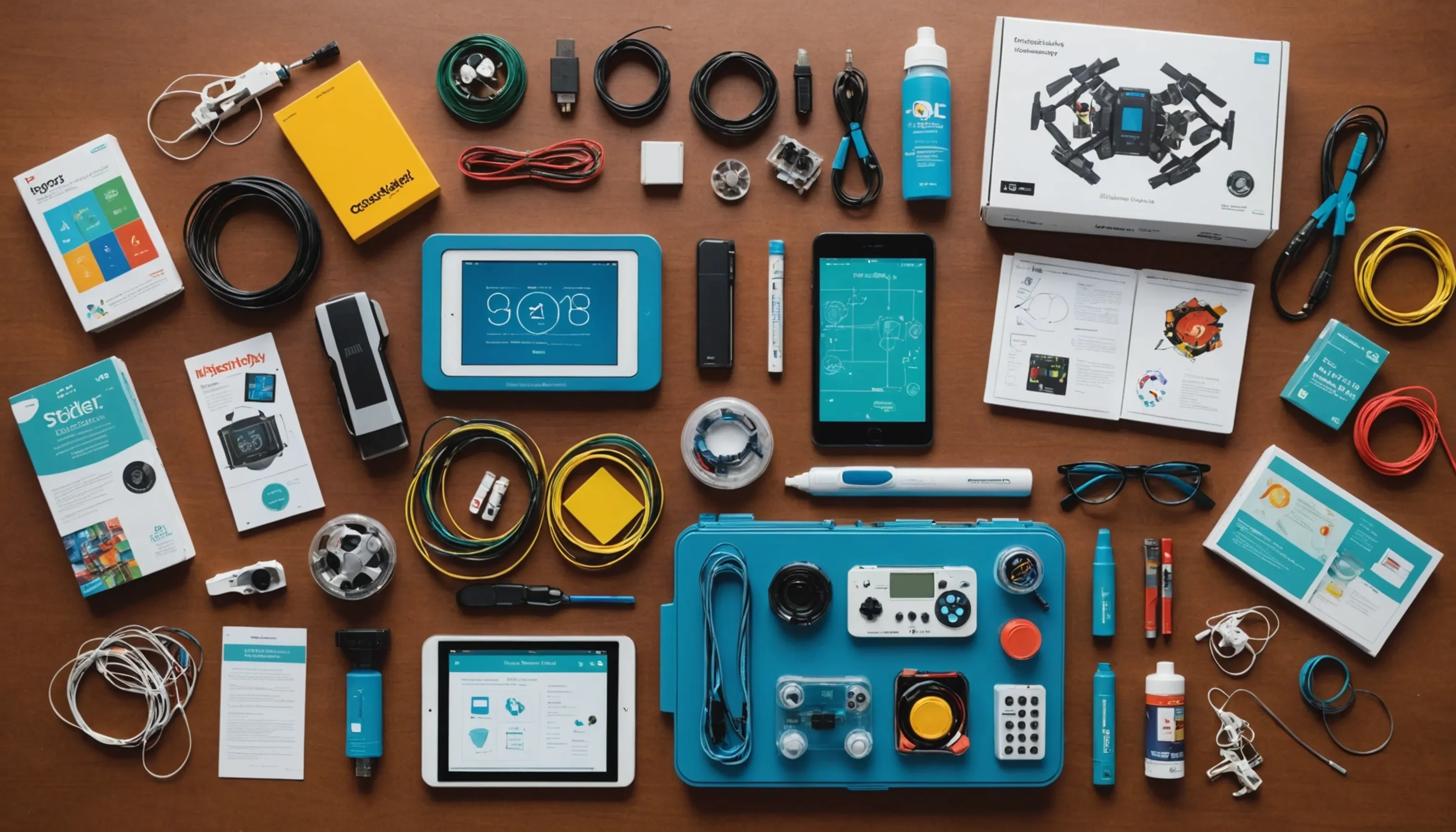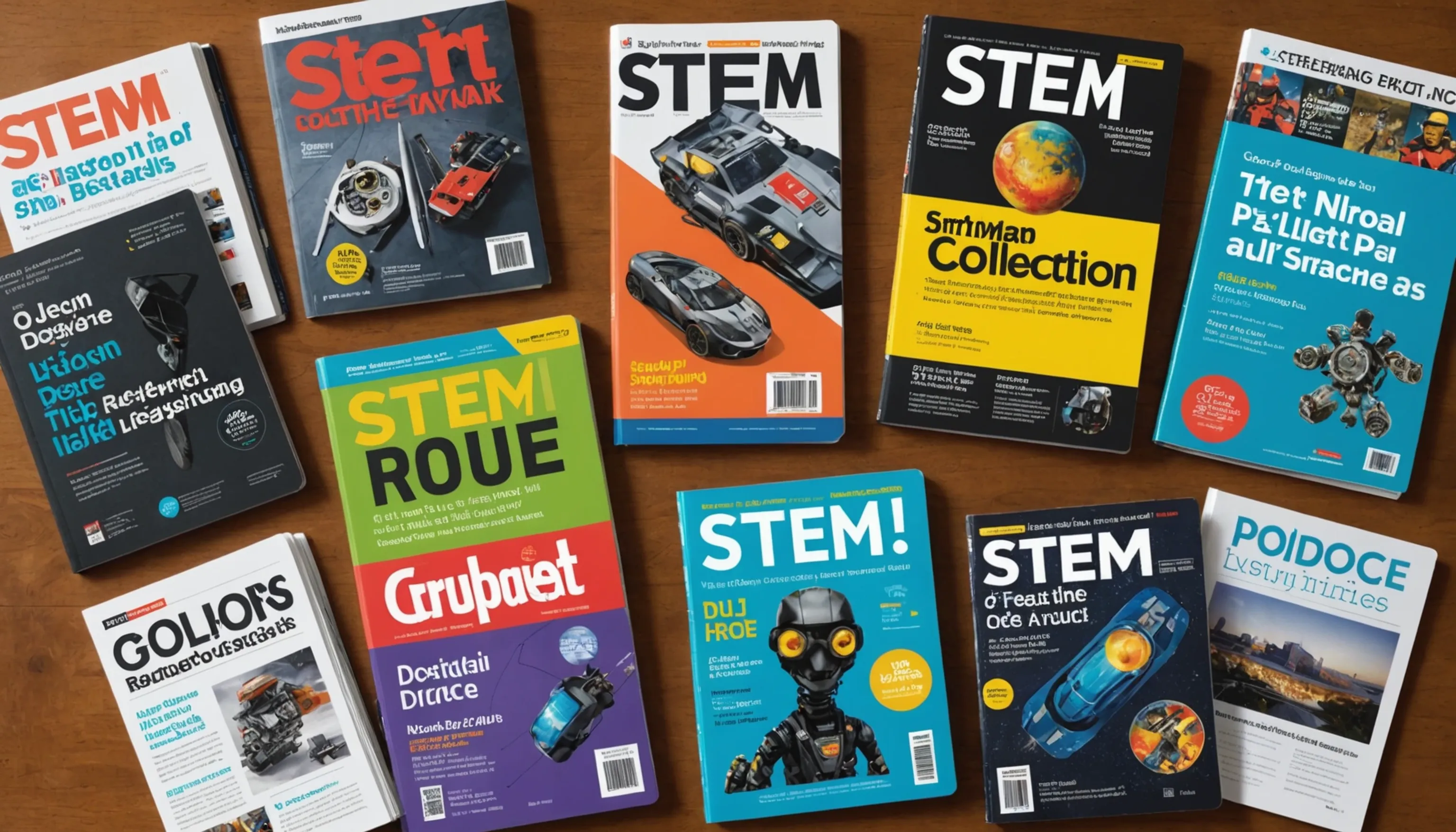10 Resources for STEM Home Schooling
 HvWHenry van Wagenberg
HvWHenry van Wagenberg
Top 10 Resources for STEM Home Schooling
Home schooling for STEM subjects has gained popularity among parents & teachers seeking quality resources. Here are the top 10 resources for STEM home schooling that can enhance learning experiences:
- Online Courses: Websites like Khan Academy and Coursera offer free courses.
- Interactive Platforms: Tools like Edmodo promote collaboration among students.
- STEM Kits: Hands-on kits from companies like KiwiCo spark creativity.
- Books: Literature tailored to teens encourages critical thinking.
- Magazines: Publications like Scientific American keep students updated.
- Podcasts: Engaging discussions on STEM topics are widely available.
- YouTube Channels: Channels like CrashCourse provide fun educational videos.
- Documentaries: Science documentaries inspire curiosity.
Online Courses for STEM Learning
Online courses have transformed the landscape of STEM education, making quality learning accessible for students of all ages. For parents & teachers, leveraging online courses can significantly enhance the home schooling experience. Here are some excellent platforms that offer engaging and comprehensive STEM learning opportunities.
Khan Academy is a well-known resource that provides free courses in mathematics, science, and technology. Its structured lessons, practice exercises, and instructional videos make it easy for students to learn at their own pace.
Coursera partners with top universities to offer courses in various STEM fields. From computer science to engineering, students can earn certificates that add value to their educational journey. Another popular platform, edX, also offers courses from renowned institutions and allows students to audit classes for free.
For younger learners, Code.org provides a fun and interactive way to learn coding and computer science. The platform offers engaging games and activities that help students develop critical thinking and problem-solving skills.
Finally, FutureLearn offers a wide range of courses in STEM subjects, focusing on real-world applications. This helps students understand the relevance of STEM in their everyday lives.
Utilizing these online courses not only fosters a love for learning but also helps students gain essential skills for future careers in STEM fields.
Interactive Learning Platforms
Interactive learning platforms play a crucial role in enhancing STEM education for students at home. These platforms provide engaging, hands-on experiences that foster critical thinking and creativity. Here are some noteworthy interactive learning platforms that parents & teachers can utilize for effective STEM home schooling.
STEMscopes is an innovative platform that offers a comprehensive K-12 STEM curriculum. It features interactive lessons, hands-on activities, and assessments, allowing students to learn through exploration and experimentation. The platform’s inquiry-based approach encourages students to ask questions and seek solutions.
Nearpod is another excellent tool that transforms traditional lessons into interactive experiences. Teachers can create engaging presentations that include quizzes, polls, and virtual reality experiences. This real-time engagement keeps students involved and enhances their understanding of complex STEM concepts.
BrainPOP provides animated educational videos covering various STEM topics. The platform includes quizzes and interactive activities that reinforce learning. Its user-friendly interface makes it accessible for younger students, making STEM education fun and engaging.
Quizlet is a versatile platform that allows students to create and study flashcards on STEM subjects. The interactive games and quizzes available on Quizlet help reinforce key concepts in a playful manner.
By incorporating these interactive learning platforms into home schooling, students not only gain knowledge but also develop a passion for STEM subjects that can inspire future career paths.

STEM Kits for Hands-On Learning
STEM kits for hands-on learning have become an essential resource for parents & teachers seeking to make science, technology, engineering, and mathematics engaging for students. These kits provide a tangible way to explore complex concepts, allowing students to experiment and create while reinforcing their understanding of STEM subjects.
One popular provider of STEM kits is KiwiCo, which offers a range of subscription boxes that cater to different age groups. Each box includes all the materials needed to complete projects that cover various STEM topics, such as robotics, chemistry, and engineering. This hands-on approach encourages creativity and problem-solving skills while making learning enjoyable.
Snap Circuits is another excellent option, allowing students to build their own electronic devices using snap-together components. This kit not only teaches basic electronics but also promotes critical thinking as students troubleshoot and design their own circuits.
For those interested in robotics, LEGO Education provides kits that enable students to build and program their own robots. These kits foster collaboration and teamwork while enhancing technical skills.
Thames & Kosmos also offers a variety of STEM kits, including chemistry sets and physics experiments. Each kit comes with detailed instructions and educational content, making it easy for students to grasp complex concepts.
Incorporating STEM kits into home schooling not only enriches the learning experience but also inspires a lifelong love for discovery and innovation.
Books and Literature for STEM Education
Books & literature play a vital role in STEM education, providing students with valuable insights and knowledge. For parents & teachers, selecting the right materials can spark curiosity and critical thinking in young learners.
STEM-focused books introduce complex concepts in an engaging manner. Titles like "The Boy Who Harnessed the Wind" by William Kamkwamba inspire innovation, while "Astrophysics for People in a Hurry" by Neil deGrasse Tyson makes science accessible.
Incorporating a variety of genres, including fiction, non-fiction, and graphic novels, can cater to different interests and learning styles, fostering a love for STEM subjects.
Recommended STEM Books for Teens
Finding the right STEM books for teenagers can significantly enhance their understanding and interest in science, technology, engineering, and mathematics. Here are some highly recommended titles that not only inform but also inspire young minds.
"The Martian" by Andy Weir is a gripping novel that showcases problem-solving and engineering principles as the protagonist, Mark Watney, survives on Mars using his knowledge of science. This book illustrates the practical application of STEM concepts in real-life scenarios.
"Hidden Figures" by Margot Lee Shetterly tells the inspiring story of African American women mathematicians at NASA. This book highlights the importance of diversity in STEM fields and showcases how their contributions were crucial to the success of the space program.
"The Code Book" by Simon Singh introduces readers to the world of cryptography. It explains the historical and modern significance of codes and ciphers, making it a fascinating read for those interested in mathematics and computer science.
"Stuff Matters: Exploring the Marvelous Materials That Shape Our Man-Made World" by Mark Miodownik explores the science behind everyday materials. This book is particularly engaging as it combines storytelling with scientific principles, making complex concepts accessible to teens.
Incorporating these recommended STEM books into your home schooling curriculum not only enriches students' knowledge but also cultivates a passion for learning that can last a lifetime.

Magazines and Journals for STEM Enthusiasts
Magazines & journals are excellent resources for STEM enthusiasts, providing the latest insights, discoveries, and trends in science, technology, engineering, and mathematics. For parents & teachers, introducing these publications into home schooling can keep students informed and engaged with current events in the STEM fields.
Scientific American is a leading magazine that covers a wide range of topics in science and technology. Its articles are written by experts and are accessible to readers of varying backgrounds, making it a great choice for teens interested in deepening their understanding of scientific concepts.
National Geographic focuses on nature, geography, and science, featuring stunning photography and in-depth articles. This magazine not only educates but also inspires students to explore the world around them.
Popular Science is another must-read for teens, providing articles on the latest innovations and advancements in technology. Its engaging writing style makes complex subjects accessible and enjoyable.
For those interested in engineering, IEEE Spectrum offers cutting-edge insights into the world of technology and engineering. This journal covers a variety of topics, from robotics to computer science, and is perfect for aspiring engineers.
Finally, MIT Technology Review provides analysis and commentary on emerging technologies and their implications. By incorporating these magazines & journals into home schooling, students will stay informed, inspired, and connected to the ever-evolving world of STEM.
Podcasts and Videos for STEM Inspiration
Podcasts & videos are fantastic tools for inspiring STEM learning among students. They provide engaging content that can captivate attention and stimulate curiosity. For parents & teachers, incorporating these resources into home schooling can enhance the educational experience.
Podcasts like "Science Vs" explore scientific controversies, dissecting topics in a fun and informative manner. Another great option is "Stuff You Should Know," which covers a wide range of subjects, including science and technology, making learning enjoyable.
YouTube channels such as "CrashCourse" offer a variety of educational videos on STEM topics, presenting complex concepts in an easily digestible format. Channels like "Veritasium" and "AsapSCIENCE" provide engaging experiments and explanations that can spark interest in various fields.
By utilizing these podcasts and videos, students can gain a deeper understanding of STEM concepts while enjoying the learning process.
Educational YouTube Channels
YouTube has become a treasure trove of educational content, particularly for STEM enthusiasts. For parents & teachers, recommending high-quality educational channels can significantly enhance the home schooling experience. Here are some top educational YouTube channels that focus on STEM subjects.
CrashCourse offers a wide range of courses in subjects like biology, chemistry, and physics. Each episode is packed with information presented in a lively and engaging manner, making complex topics accessible to teenagers.
Khan Academy also has a YouTube channel that provides instructional videos covering various subjects, including math and science. The platform's clear explanations and visual aids help students grasp challenging concepts.
Veritasium explores scientific principles through experiments and interviews with experts. The engaging storytelling approach helps students see the real-world applications of scientific concepts.
MinutePhysics uses simple animations to explain physics concepts in under a minute. This channel is perfect for visual learners looking for quick yet informative content.
AsapSCIENCE breaks down scientific topics into fun, catchy animations, making learning enjoyable and memorable. Their videos often tackle popular science questions, which can spark students' interest in exploring further.
Incorporating these YouTube channels into home schooling can make STEM education interactive and enjoyable, inspiring students to delve deeper into their studies.
Popular STEM Podcasts
Podcasts have emerged as an engaging medium for STEM education, making complex topics accessible and entertaining for students. For parents & teachers, recommending popular STEM podcasts can enrich the home schooling experience and inspire curiosity in young learners. Here are some standout STEM podcasts to consider.
"Science Vs" is a fantastic podcast that pits facts against popular myths and misconceptions. Each episode dives into a specific topic, such as vaccines or diets, using scientific evidence to clarify the truth. This critical thinking approach encourages students to question assumptions and seek evidence-based answers.
"Stuff You Should Know" covers a wide range of subjects, including technology and science, presented in an engaging and conversational format. The hosts break down complex concepts into digestible segments, making it suitable for teens.
"StarTalk Radio", hosted by astrophysicist Neil deGrasse Tyson, explores the universe and science in a fun and accessible way. The blend of humor and expert insight makes it appealing to a broad audience.
"The Infinite Monkey Cage" features scientists discussing various topics in an entertaining manner, often with humorous anecdotes and lively debates. This podcast demystifies scientific principles while keeping listeners engaged.
By incorporating these popular STEM podcasts into home schooling, students can develop a deeper understanding of scientific concepts while enjoying the learning process.
Science and Technology Documentaries
Science and technology documentaries are powerful tools for enhancing STEM education, providing students with visually engaging narratives that explore complex concepts and real-world applications. For parents & teachers, integrating these documentaries into home schooling can inspire curiosity and foster a love for learning. Here are some highly recommended documentaries worth watching.
"Cosmos: A Spacetime Odyssey", hosted by Neil deGrasse Tyson, takes viewers on a breathtaking journey through the universe. This documentary series explores various scientific topics, from the origins of life to the vastness of space, making it an excellent resource for students interested in astronomy and physics.
"Our Planet" is a stunning nature documentary that highlights the beauty of Earth and the importance of conservation. Narrated by David Attenborough, it combines breathtaking visuals with powerful messages about climate change, encouraging students to think critically about environmental issues.
"The Social Dilemma" examines the impact of social media on society, blending technology with social science. This documentary prompts discussions about technology's role in our lives, making it a relevant watch for teens.
"Particle Fever" follows scientists during the launch of the Large Hadron Collider, providing a behind-the-scenes look at groundbreaking research in particle physics. This documentary highlights the excitement and challenges of scientific discovery.
By incorporating these science and technology documentaries into home schooling, students can gain insights into important concepts while being inspired by real-world stories of innovation and discovery.
